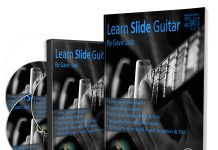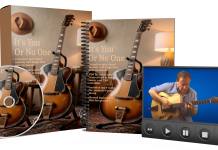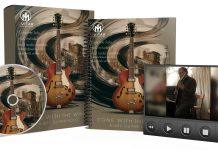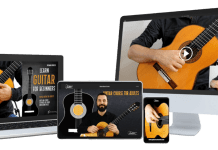This post may contain affiliate links. As an Amazon associate, Google associate as well as associate for other programs, Guitar & Music Institute may earn commissions from qualifying purchases.
Are you a beginner looking to kickstart your guitar journey? Look no further! In this article, we will introduce you to a variety of beginner guitar exercises that will help you build a strong foundation and enhance your playing skills.
Whether you aspire to become the next Jimi Hendrix or simply want to strum your favorite tunes, these exercises are designed to improve your technique and confidence on the fretboard.

Before we dive into the exercises, make sure to check out our latest free and paid guitar books and downloads at gmiguitarshop. They provide valuable resources to complement your practice sessions.
Key Takeaways:
- Beginner guitar exercises are crucial for developing technique and confidence.
- They focus on strengthening all fingers, improving dexterity, and increasing speed of play.
- Start with the fundamentals and build a strong foundation.
- Gradually increase the difficulty level and challenge yourself.
- Remember to practice consistently and combine exercises with different licks.
The Importance of Fundamentals
Before diving into advanced techniques, it’s crucial to start with the fundamentals. Beginner guitar exercises lay the foundation for future shredding skills. These exercises help develop stamina, improve picking arm strength, and build muscle memory for the picking hand. It’s important to set a comfortable metronome speed and gradually increase it over time to challenge yourself.
Why are basic guitar exercises important?
- Builds stamina for longer playing sessions
- Improves picking arm strength
- Develops muscle memory for the picking hand
- Lays the foundation for advanced techniques
When starting with basic guitar exercises, it’s essential to focus on proper technique and form. Pay attention to your hand position, finger placement, and posture. By practicing these exercises regularly, you’ll build a solid foundation that will support your growth as a guitar player.
Tips for practicing beginner guitar exercises:
- Start with a slow tempo and gradually increase the speed
- Focus on accuracy and clean execution of each exercise
- Keep your fingers relaxed and avoid tension
- Give yourself breaks to prevent overexertion
Remember, mastering the basics is key to becoming a skilled guitarist. Practicing beginner guitar exercises regularly will help you develop the necessary skills and techniques for more advanced playing. So grab your guitar, set your metronome, and start building a solid foundation for your musical journey.
Developing Alternate Picking Technique
Alternate picking is an essential skill for any guitarist. It allows you to play fast and precise melodies while maintaining a smooth and consistent sound. In this exercise, we will focus on developing your alternate picking technique using eighth notes and both downstrokes and upstrokes.
The Exercise:
- Start by setting your metronome to a comfortable speed. This will ensure that you play with accuracy and build a solid foundation.
- Begin by playing a simple pattern using eighth notes (one note per beat). Start with a downstroke on the first note, followed by an upstroke on the second note, and so on.
- Repeat the pattern several times, making sure to maintain a steady rhythm and consistent tone. Focus on alternating between downstrokes and upstrokes smoothly and accurately.
- Once you feel comfortable with the pattern, gradually increase the metronome speed. This will challenge your dexterity and help you build speed while maintaining control.
Remember, the goal of this exercise is to make your downstrokes and upstrokes sound as similar as possible. This will ensure that your playing is smooth and precise, eliminating any unwanted accents or inconsistencies.
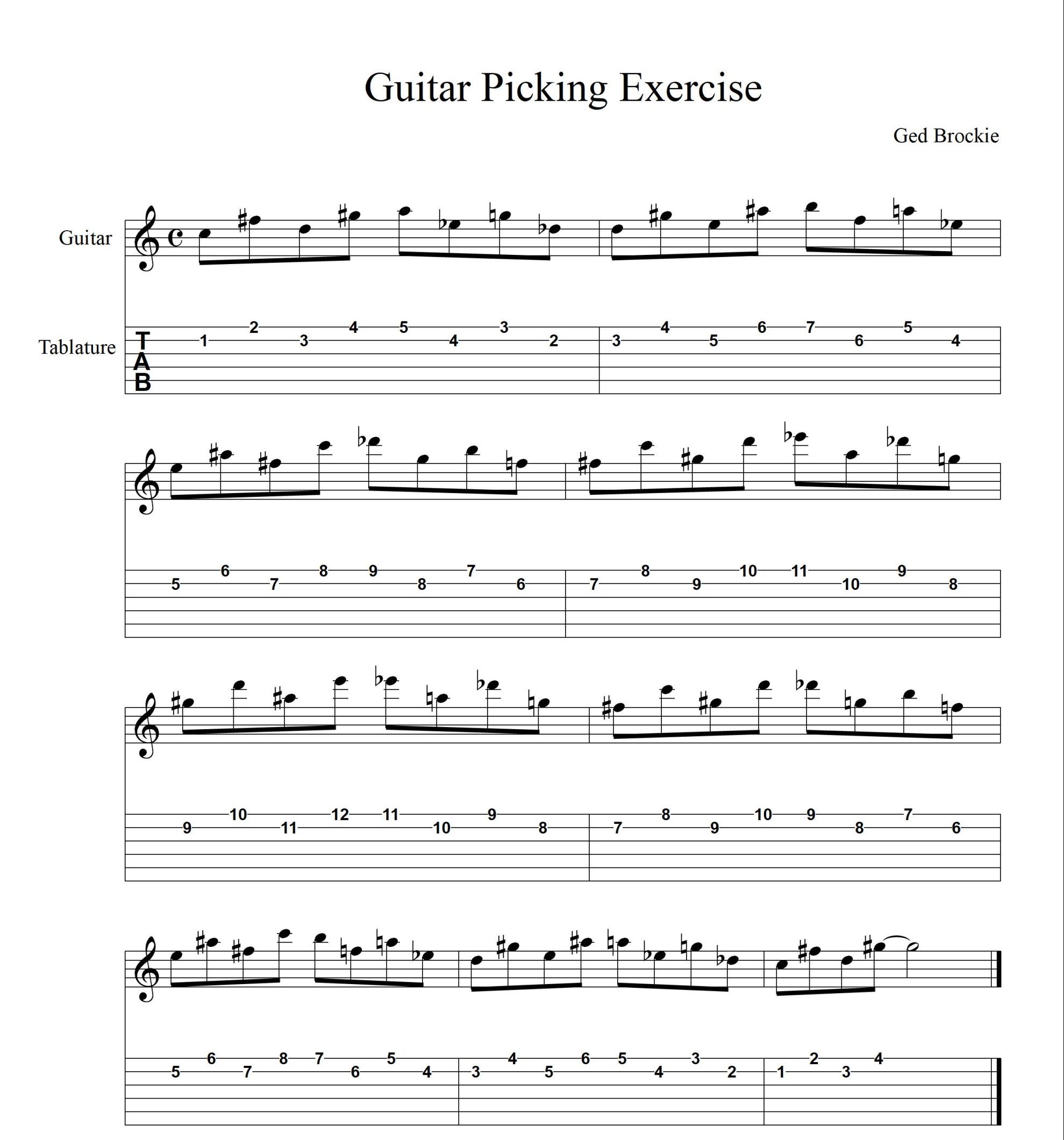
For more easy guitar exercises and resources to improve your playing, make sure to check out our latest free and paid guitar books and downloads at GMI Guitar Shop.
Strengthening the Fretting Hand
The fretting hand is an essential component of guitar playing. To improve your technique and coordination, it’s important to focus on strengthening your fretting hand. One effective exercise for accomplishing this is through legato playing.
To begin, position your index finger on the 5th fret. From there, perform hammer-ons and pull-offs with your middle, ring, and pinky fingers. The goal of this exercise is to play as hard and fast as possible for 15-second intervals, gradually increasing the duration over time.
By engaging in this exercise, you will develop finger strength and enhance the coordination between your fretting fingers. This will greatly improve your ability to navigate the fretboard with ease and precision.
Here is an image to help visualize the exercise:
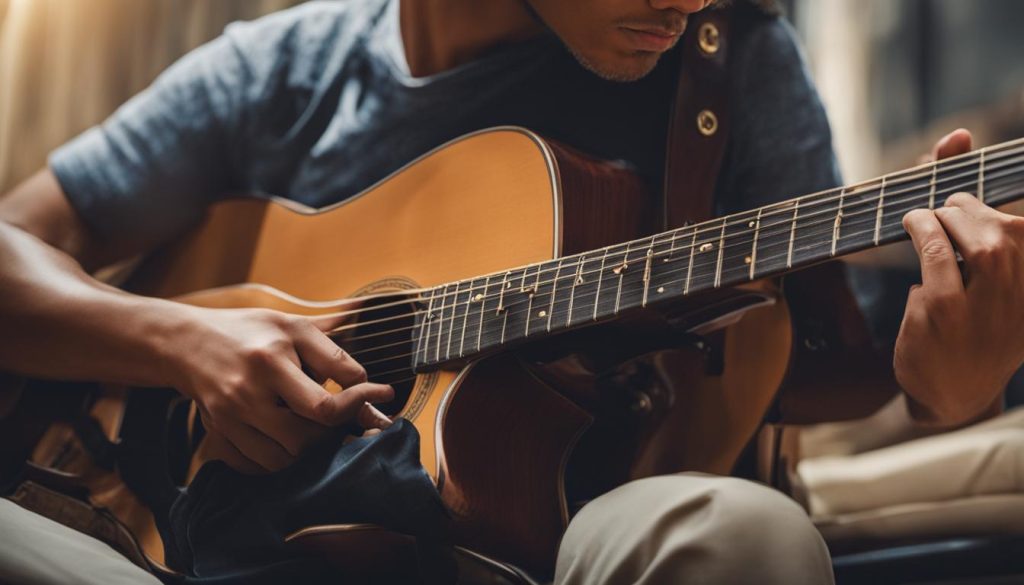
Remember, consistency in practicing beginner guitar techniques is key to mastery. Make this exercise a regular part of your practice routine and watch your fretting hand strength improve.
Strengthening and Building Technique
One of the most important aspects of becoming a proficient guitarist is building finger and hand strength. To achieve this, it’s crucial to incorporate beginner guitar exercises that focus on building technique. One such exercise is a basic warm-up exercise that lays the foundation for faster playing in the future.
Begin by positioning yourself at the first fret of the guitar. Pluck each string with a different finger, moving up and down the fretboard. The key is to maintain each finger’s position on its respective fret without squeezing other fingers together. By doing so, you’ll train your fingers to work independently, enhancing your overall technique.
This exercise prioritizes strength over speed, allowing you to develop the necessary muscle memory and control for more advanced techniques. Practice this exercise regularly to gradually improve your finger and hand strength, which will ultimately translate into improved playing ability.

Building Speed
Speed is a crucial element in shredding guitar playing. As a novice player, it’s important to focus on building speed gradually to avoid sacrificing accuracy and control. One effective exercise for increasing speed is playing the same sequence of notes as fast as possible from the first string to the sixth string and back. Start by setting a slower tempo on your metronome and play the sequence at a comfortable speed. Practice this pattern repeatedly, gradually increasing the tempo as you become more comfortable and confident.
Remember, the goal is not just to play fast, but to maintain precision and control at high speeds. Pay attention to the cleanliness of your picking and fretting hand movements, making sure each note is articulated clearly. This exercise will not only develop your speed and agility on the fretboard but also enhance your overall playing abilities.
If you’re looking for more in-depth instruction on building speed and improving your guitar playing, be sure to check out our latest free and paid guitar books and downloads at https://gmiguitarshop.com, click the image to the right of this article. We have a variety of resources designed specifically for novice players like you to help you master essential guitar techniques and elevate your playing to the next level.
Conclusion
Congratulations on completing these beginner guitar exercises! By consistently practicing these exercises, you will notice a significant improvement in your technique, speed, and overall playing ability.
Remember, it’s important to start slow and gradually increase the difficulty level as you become more comfortable. These exercises provide the foundation for your journey as a guitarist, and with dedication and perseverance, you can achieve great results.
As you continue your guitar practice, start exploring different licks and melodies, and integrate them with the techniques you have learned. This will allow you to unleash your creativity and develop your own unique guitar style.
If you’re looking for additional resources and support on your guitar journey, check out our latest free and paid guitar books and downloads at https://gmiguitarshop.com/. We offer a wide range of materials to help you further enhance your skills and explore new techniques.
FAQ
How do beginner guitar exercises help in building technique?
Beginner guitar exercises are essential for building technique by focusing on strengthening fingers, improving dexterity, and increasing speed of play.
Which exercises are important for beginners to start with?
It is crucial to start with the fundamentals, including basic warm-up exercises that help build finger and hand strength and exercises that focus on developing alternate picking and strengthening the fretting hand.
What is the purpose of alternate picking exercises?
Alternate picking exercises are designed to develop alternate picking technique by playing eighth notes using both downstrokes and upstrokes, ensuring smooth and precise playing.
How do exercises focusing on the fretting hand help?
These exercises help strengthen the fretting hand through legato playing, improving finger strength and coordination between the fingers.
What is the purpose of basic warm-up exercises?
Basic warm-up exercises focus on building finger and hand strength, laying the foundation for faster playing in the future.
How do speed exercises contribute to guitar playing?
Speed exercises focus on playing the same sequence of notes as fast as possible, helping develop speed and agility on the fretboard.
Why is consistent practice important?
Consistent practice of beginner guitar exercises ensures improvement in technique, speed, and overall playing ability over time.
Source Links
- https://www.guitarw
orld.com/lessons/three-steps-shred-fundamental-daily-practice-techniques-about-15-minutes
- http://www.lessonrating.com/students/expert-articles/guitar/5-beginner-guitar-exercises-that-will-make-you-shred/
- https://nationalguitaracademy.com/guitar-shredding-exercises/
This post may contain affiliate links. As an Amazon associate, Google associate as well as associate for other programs, Guitar & Music Institute may earn commissions from qualifying purchases.



